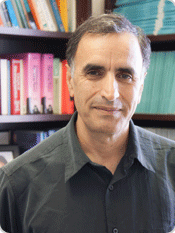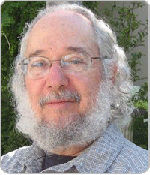- Details
-
Category: Department News
-
Published: Wednesday, September 12 2012 14:48

Dr. Hassan Jawahery, the Gus T. Zorn Professor of Physics, has been named a Distinguished University Professor. This designation is the campus’ highest academic honor, reserved for those whose scholarly achievements “have brought distinction to the University of Maryland.” It recognizes Jawahery’s efforts in precision measurements of the properties and interactions of subatomic particles, part of the quest to solve fundamental puzzles such as the matter/anti-matter asymmetry in the Universe.
After graduating from Tehran University in 1976, Jawahery moved to Tufts University and received his Ph.D. in 1981. He accepted postdoctoral and research assistant professor appointments at Syracuse University and was named the physics coordinator of the CLEO particle experiment (1987-1988) based at Cornell. In 1987, he joined the University of Maryland, and worked on the Omni-Purpose Apparatus (OPAL) experiment at CERN’s Large Electron-Positron collider (LEP).
Jawahery was one of the founding members of the celebrated BaBar particle physics experiment, designed, built and operated by an international collaboration of over 600 physicists from 10 countries at the Stanford Linear Accelerator (SLAC). He served as the physics analysis coordinator of the experiment (2001-2002), and for two years (2006-2008) served as BaBar “spokesperson,” a role combining the functions of chief scientist and CEO. BaBar observed a process that violates matter/anti-matter symmetry (and consequently time-reversal symmetry), and the effect was substantial: in 2008, the Nobel Prize in Physics was awarded to Kobayashi and Maskawa, whose 1973 prediction of broken symmetry in the framework of the Standard Model initiated the thirty-year experimental verification effort finally achieved by BaBar and a competing experiment in Japan.
Recently, Jawahery has been playing a leading role in the development of future experiments, such as the Super-B experiment at the Frascati Lab near Rome. The aim is to increase the production of bottom/anti-bottom quarks by several orders of magnitude over that produced at SLAC, which will allow for precision measurements that may reveal evidence for new physics, in synergy with the current efforts at CERN’S LHC supercollider.
Jawahery is the Associate Editor of the Annual Review of Nuclear and Particle Science, the field’s most prestigious journal for summary publications. He was elected a Fellow of the American Physical Society in 2004 and the American Association for the Advancement of Science in 2010.
Jawahery will be recognized at the University of Maryland’s 29th Annual Faculty and Staff Convocation on Tuesday, October 9 at 3:00 p.m. in the Memorial Chapel.


